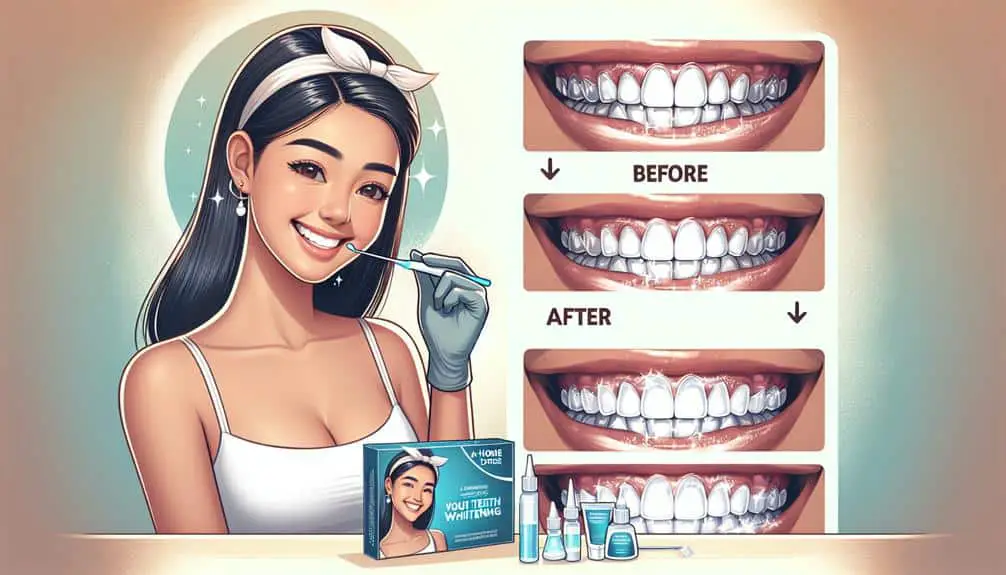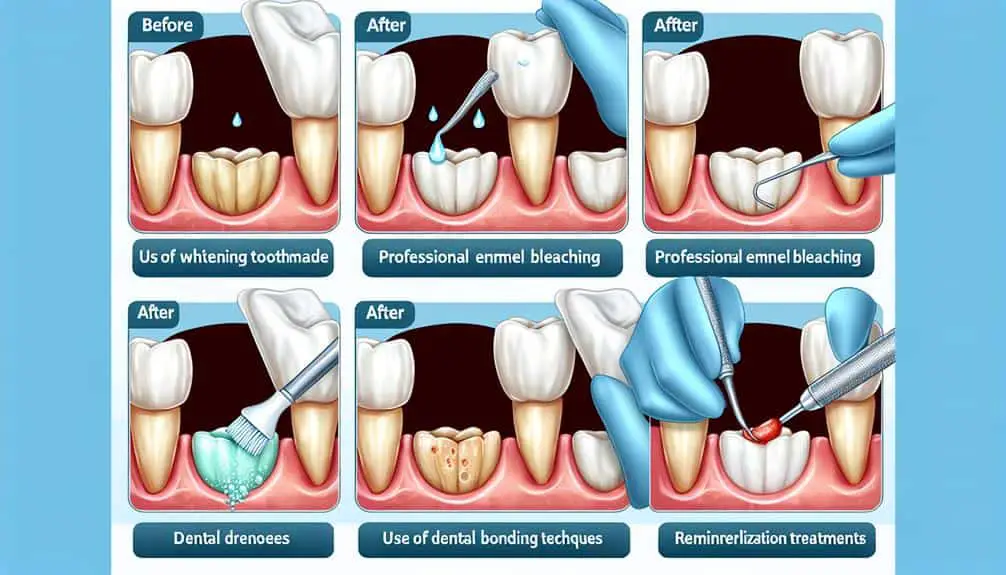At-home teeth whitening kits are enamel-safe because they contain specialized mechanisms that protect and strengthen your enamel while effectively whitening your teeth. These kits focus on maintaining a proper pH balance to prevent enamel erosion and include ingredients like potassium nitrate and fluoride to enhance enamel health. Clinical studies have shown that these enamel-friendly formulations promote remineralization and prevent erosion, endorsed by dental professionals for their gentle yet effective results. Discover more about how these kits contribute to overall enamel health.
Key Points
- Enamel-strengthening agents like fluoride and potassium nitrate protect enamel.
- pH-balanced formulas in kits prevent enamel erosion.
- Clinical studies confirm enamel-safe formulations promote remineralization.
- Dentist-recommended kits ensure long-term enamel health.
- Ingredients focus on both whitening and enamel strengthening for safety.
Enamel Protection Mechanisms in Whitening Kits
When using at-home teeth whitening kits, the enamel protection mechanisms integrated in these products play an essential role in safeguarding your teeth during the whitening process. These mechanisms focus on two key aspects: enamel strengthening and whitening effectiveness. Enamel, the outer layer of your teeth, is vital for protecting your teeth from decay and damage. The ingredients in whitening kits are formulated to not only whiten your teeth but also strengthen the enamel, ensuring that the whitening process doesn't compromise the integrity of your teeth.
One important factor in maintaining enamel health is the pH level of the whitening products. The pH level refers to the acidity or alkalinity of the solution. Enamel erosion prevention is achieved by carefully balancing the pH level in these kits. By keeping the pH at an optimal level, the whitening process can effectively remove stains without causing harm to the enamel. This meticulous approach helps in ensuring that your teeth remain strong and healthy while achieving a brighter, whiter smile.
Ph Balance for Enamel Safety
Maintaining the pH balance in at-home teeth whitening kits is essential for ensuring enamel safety and overall tooth health. When the pH level is too low (acidic), it can lead to enamel erosion, putting your teeth at risk.
Here are three important points to keep in mind for maintaining proper pH balance in whitening products:
- Neutralizing Acids: Look for whitening kits that contain ingredients like potassium nitrate or fluoride, which help neutralize acids that can harm your enamel.
- Avoiding Acidic Foods: Limiting your consumption of acidic foods and beverages like citrus fruits, sodas, and coffee can also help maintain a healthy pH balance in your mouth.
- Balanced Formulas: Choose whitening kits with carefully formulated pH-balanced solutions to make sure that the products are gentle on your enamel while effectively brightening your teeth.
Ingredient Breakdown for Enamel Health
To guarantee top enamel health, understanding the components in at-home teeth whitening kits is essential. An ingredient analysis reveals that many of these kits contain enamel-strengthening agents such as potassium nitrate and fluoride. These ingredients not only help in whitening teeth but also contribute to the overall health of your enamel. Potassium nitrate is known for its desensitizing properties, which can be beneficial for individuals with sensitive teeth. Fluoride, on the other hand, plays a vital role in preventing tooth decay and strengthening enamel.
Moreover, advanced whitening technology in these kits ensures that the whitening process is gentle yet effective on your enamel. Carbamide peroxide and hydrogen peroxide are commonly used in these kits for their whitening properties. These components work by breaking down stains on the teeth without causing harm to the enamel. When used as directed, at-home teeth whitening kits can provide a safe and effective way to enhance the appearance of your smile while maintaining top enamel health.
Clinical Studies on Enamel-Safe Formulations
An examination of clinical studies provides valuable insights into the effectiveness and safety of enamel-friendly formulations used in at-home teeth whitening kits. These studies have shown that enamel-safe formulations offer significant benefits beyond just whitening your teeth. Here are some key findings:
- Enamel Remineralization Benefits: Clinical research has demonstrated that certain at-home teeth whitening kits containing enamel-safe ingredients can promote enamel remineralization. This process helps strengthen the enamel, making it more resistant to decay and erosion.
- Enamel Erosion Prevention: Studies have indicated that enamel-safe formulations in teeth whitening kits can help prevent enamel erosion caused by acidic foods, drinks, or poor oral hygiene habits. By using these kits, you can safeguard your enamel against damage while achieving a brighter smile.
- Professional Endorsement: Dental professionals have supported the use of enamel-safe at-home teeth whitening kits based on the positive outcomes observed in clinical trials. Their endorsement underscores the effectiveness and safety of these formulations for maintaining a healthy smile.
Dentist Recommendations for Enamel-Friendly Kits
Dental professionals widely recommend enamel-friendly teeth whitening kits for their proven effectiveness and safety in enhancing your smile while maintaining enamel health. When selecting a kit, consider those endorsed by dentists, as they're formulated to be gentle on enamel. Dentists often emphasize the importance of following proper application techniques to guarantee best results without compromising enamel integrity. It's essential to carefully read and adhere to the instructions provided in the kit to minimize any potential risks.
Moreover, enamel-friendly kits are favored for their long-term effects. Dentists highlight that these kits not only whiten teeth but also help preserve enamel health over time. By choosing a whitening solution that's enamel-safe, you can enjoy a brighter smile without concerns about damaging your teeth in the process. Remember that consistent and correct usage of enamel-friendly kits is key to achieving lasting results while safeguarding the health of your enamel.
Frequently Asked Questions
Are At-Home Teeth Whitening Kits Safe for People With Sensitive Teeth or Existing Enamel Damage?
If you have enamel sensitivity or existing damage, at-home teeth whitening kits may not always be safe. While they can be effective, it's important to prioritize enamel health and protection. Consult a dentist for personalized recommendations.
Can At-Home Teeth Whitening Kits Cause Enamel Erosion Over Time With Regular Use?
As you use at-home teeth whitening kits regularly, enamel erosion can occur over time if not careful. Prioritize enamel protection by choosing kits with balanced whitening effectiveness and sensitivity considerations. Maintain enamel strength for long-term oral health.
How Long Does It Typically Take to See Results From Using At-Home Teeth Whitening Kits, and Is There a Maximum Recommended Usage Frequency to Protect Enamel?
To see results from at-home teeth whitening kits, typically takes a few weeks. Follow recommended usage frequency to protect enamel. Overuse can harm enamel health. Be patient and consistent for a brighter, healthier smile.
Are There Any Specific Dietary or Lifestyle Recommendations to Follow While Using At-Home Teeth Whitening Kits to Maintain Enamel Health?
As you begin on this journey for a brighter smile, remember to embrace dietary restrictions that favor enamel health and lifestyle changes that support your dental goals. Your dedication will shine through your radiant smile.
What Are the Potential Risks of Using At-Home Teeth Whitening Kits on Enamel if Not Used Correctly or if Overused?
To safeguard your enamel and achieve peak whitening results, ensure correct usage of at-home teeth whitening kits. Risks of improper or excessive use may include enamel damage, tooth sensitivity, and uneven whitening. Consult dental professionals for guidance.



